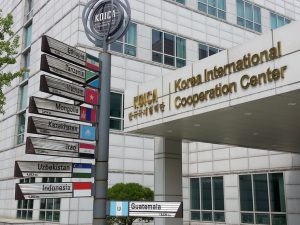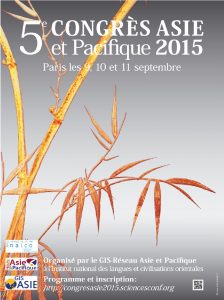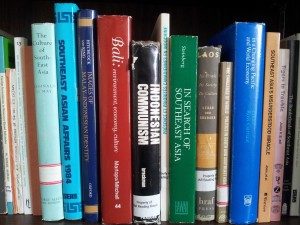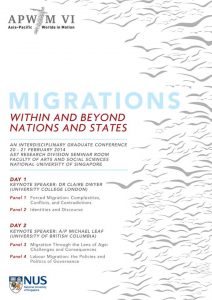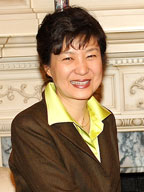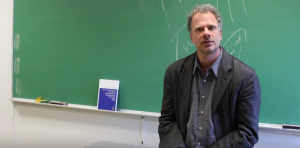Why should we care about transnational social capital in development cooperation?
Memo #386 By: Rennie J. Moon – rennie.moon [at] yonsei.ac.kr and Gi-Wook Shin – gwshin [at] stanford.edu Higher education aid as transnational social capital Current approaches to higher education aid have focused either on developing human resources or on building social capital in the local context. For instance, donor countries offer various programs to train […]
For Love of Languages, Travel, and Fieldwork: A tribute to Benedict Anderson
Memo #357 By Apichai W. Shipper – apichai.shipper [at] georgetown.edu There will never be another Ben Anderson but he has left a part of himself in all who knew him. He instilled in our DNA, among many other things, a love of languages and fieldwork. In an age where regressions and generalizable models sometimes seem to shunt careful […]
Lingua Franca?: Francophone scholarship on the Asia-Pacific
Memo #349 By: Gisèle Yasmeen – gisele.yasmeen [at] ubc.ca While English is often thought of as the international academic lingua franca, there is significant scholarship on Asia in other languages, including French. French-language scholarship on the Asia-Pacific should be valued, particularly in Canada – a bilingual country home to a number of French-speaking Asianists who […]
Russia’s New Pivot to Asia: The Emergence of a New Geopolitics
Memo #341 By Alexander Korolev – akorolev [at] nus.edu.sg Many observers have recently registered a new shift in Russia’s foreign policy, labelling it, “pivot to Asia.” President Putin himself announced that “Russia’s reorientation toward the Pacific Ocean and the dynamic development in all our [Russia’s] eastern territories are our priority for the whole 21st century.” […]
Whither Area Studies?
Memo #316 Advancing the project of Comparative Area Studies and fruitful Area Studies Comparisons: an Intervention from Europe By Jürgen Rüland – juergen.rueland [at] politik.uni-freiburg.de & Mikko Huotari – mikko.huotari [at] merics.de There is no universal ultimate golden mean between disciplinary research and area studies. Viable intermediate positions are eventually dependent on an individual researcher’s […]
Music for the Mind? Virtuosity and Performativity in Celebrity Diplomacy
Memo #314 By Hyung-Gu Lynn – hlynn [at] mail.ubc.ca Does celebrity diplomacy work? If so, based on what measures, why, how and for whom? In the afterglow of bravura passages powerful yet precise, arpeggios determined yet delicate, these questions arose, at least in one small corner of my brain. The United Nations Day concert in the General […]
Third Culture Kids and the Rise of a Cosmopolitan Ethos in the Asia-Pacific
Memo #289 By Grégoire Legault – gregoire.legault [at] alumni.ubc.ca The world is changing, thanks in great part to unparalleled levels of migration. According to the United Nations, more than 230 million people were living outside of their countries of birth in 2013, many of them originally born in Asia. Conceptually, foreign-born residents of third countries already […]
Gaps in the Protection of Civilian Victims of Armed Violence
Memo #281 By Ramesh Thakur – ramesh.thakur [at] anu.edu.au As demonstrated by recent events in Sudan, Sri Lanka, Libya, and Syria—and earlier in Rwanda, the Balkans and East Timor during the 1990s—the numbers of civilians killed in contemporary armed conflicts is intolerably high. Their plight is a lasting stain on an internationalized human conscience. Our […]
The Paradox of Women Leaders in Asian Democracies
Memo #277 By Timothy S. Rich – timothy.rich [at] wku.edu Political life in Asian countries is often characterized as a man’s world, especially compared to its Western counterparts. Yet we have also seen increasing political leadership opportunities for women in the region. Since 2000 alone, women have been elected prime minister in Bangladesh and Thailand, […]
The Global Intensification of Supplementary Education
Memo #271 Featuring Julian Dierkes Recently, Ee-Seul Yoon of the Faculty of Education at UBC in coordination with the Asia Pacific Memo sat down with Dr. Julian Dierkes, Associate Professor and Keidanren Chair in Japanese Research at UBC’s Institute for Asian Research, to pose a few questions about Professor Dierkes’ recently co-edited volume, Out of the Shadows: The Global […]
